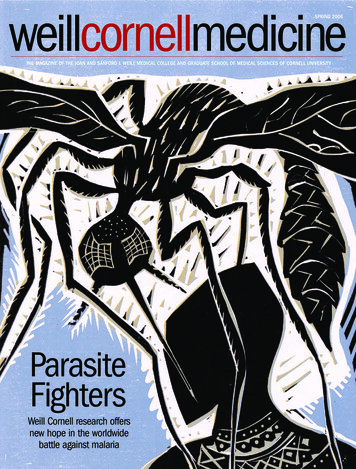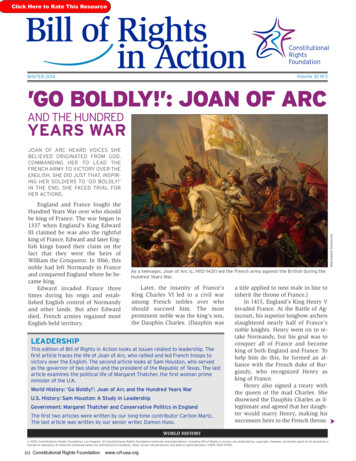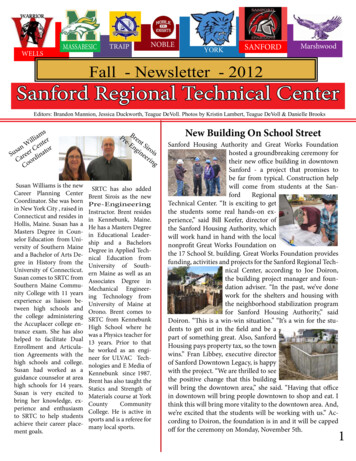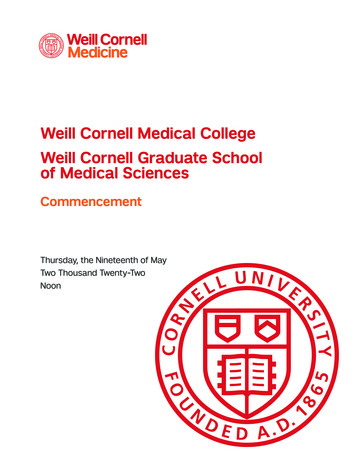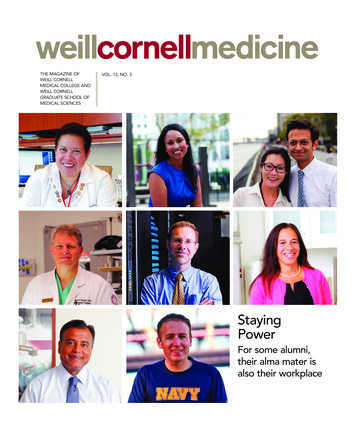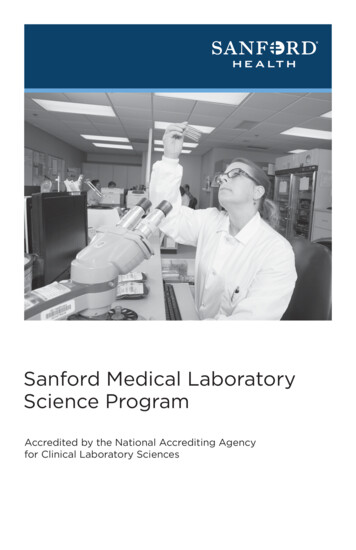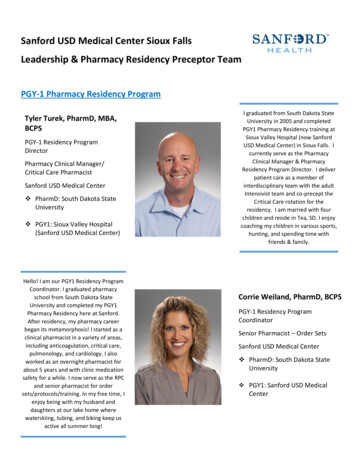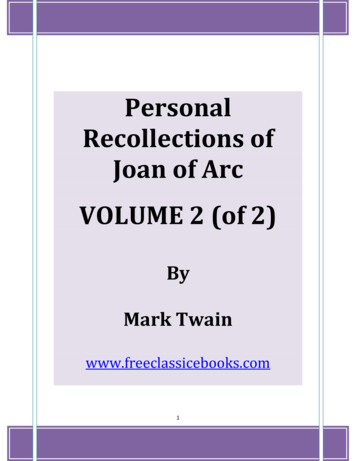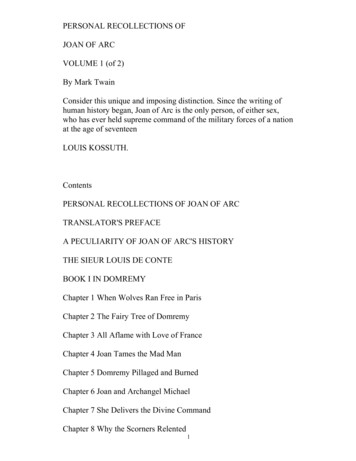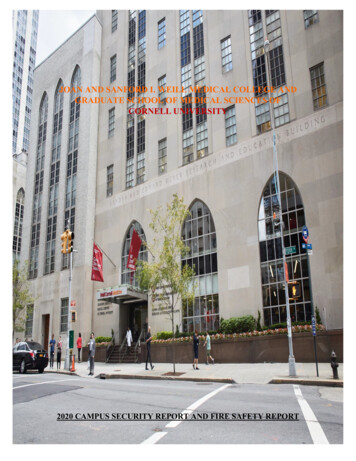
Transcription
JOAN AND SANFORD I. WEILL MEDICAL COLLEGE ANDGRADUATE SCHOOL OF MEDICAL SCIENCES OFCORNELL UNIVERSITY2020 CAMPUS SECURITY REPORT AND FIRE SAFETY REPORT1
Contents2020 CAMPUS SECURITY REPORT AND FIRE SAFETY REPORT .1I.Introduction .3II.Reporting Crimes and Emergencies.4III.Security and Access to Campus Facilities and Residences .6IV.Advisory Committee on Campus Security.7V.Programs to Encourage Crime Prevention and Security .7VI.Campus Crime Statistics .12VII. Disclosures to Alleged Victims of Crimes of Violence or Sexual Offenses .12VIII. Statement on Sexual Assault .12IX.Resources for Victims .16X.Reporting on Bias and Hate Related Crimes.18XI.Missing Person Procedures .19XII. Crime Statistics and Incident Data 2018-2020 .19XIII. Statement on Drug and Alcohol Abuse .23XIV. Joan and Sanford I. Weill Medical College and Weill Graduate School of Medical Sciences Statement onDrug and Alcohol Abuse .232020 ANNUAL FIRE SAFETY REPORT .27Section 1 – Description of each Student Housing Facility Fire Safety System .29Section 2 – Number of Fire Drills during the previous Calendar Year .30Section 3 – Policies or Rules on Portable Electrical Appliances, Smoking, and Open Flames in a Student HousingFacility .30Section 4 – Procedures for Student Housing Evacuation in the Case of a Fire.31Section 5 – Policies regarding Fire Safety Education and Training Programs provided to the Students andEmployees .33Section 6 – List of the Titles of each Person or Organization to which Students and Employees should Report thata Fire Occurred .35Section 7 – Plans for Future Improvements in Fire Safety, if determined necessary by the Institution .35Section 8 – Fire Statistics .37Appendix A –Student Housing Facility Fire Protection System Description.38Appendix B – Campus Fire Log and Fire Statistics .392
I.IntroductionFederal laws require the Joan and Sanford I. Weill Medical College and Graduate School ofMedical Sciences (jointly referred to as the “Medical College” or “WCMC”) of Cornell Universitydistribute information annually concerning campus security and crime prevention, and fire safety. Thefollowing summary is provided to all students and employees, as well as applicants for admission andemployment upon request, so that all members of the WCMC community are aware of campus securitypolicies and procedures. The safety and well-being of students, faculty, and staff is a top priority atWCMC.The WCMC Campus Annual Security Report (“Security Report”) is prepared by the WCMCAdvisory Committee on Campus Safety and Security (the Campus “Security Committee”), incooperation with the Housing Department, Environmental Health and Safety, the Office of RiskManagement, the Department of Engineering and Maintenance, Office of Institutional Equity, Office ofGeneral Counsel, and New York Presbyterian Hospital Security (“NYP Security”), which providessecurity services to WCMC. The Security Committee, which includes faculty, administration, and studentrepresentatives, meets monthly to review campus crime prevention and related security matters atWCMC. The Security Committee also provides guidance in implementing new security procedures andcampus awareness programs. Each member of the WCMC community receives an annual emailproviding a web address to the Security Report, with information that can help make the experiences atthe Medical College safer and more enjoyable.This past year has been a unique and challenging experience for the entire campus community.Students, faculty, and staff have had to adjust to a variety of changes that have allowed us to safelynavigate the hurdles that have arisen from the COVID-19 pandemic, including a safe reopening for thefall semester. Throughout this pandemic, NYP Security has been on campus fulfilling our mission ofservice to the Weill Cornell community.This Security Report includes information on procedures for reporting crimes and emergencies,policies, and procedures for addressing crimes on the WCMC campus. Crime statistics and informationon procedures for reporting and addressing crimes and emergencies at the Weill Cornell Medical Collegein Qatar (“WCMC-Q”) are available at tudentaffairs/student-handbook.The Annual Fire Safety Report includes statistics for each on-campus and off-campus studenthousing facility, including fire safety education and training programs, and evacuation drills conducted.The report also includes policies and procedures, rules and guidance concerning fire safety. The reportis published annually along with the Security Report.3
II.Reporting Crimes and EmergenciesIncidents of crime and other emergencies occurring on the Medical College campus that requireimmediate assistance should be reported to the New York City Police Department (“NYPD”) by dialing911 and NYP Security at 212-746-0911. Reports may be made to NYP Security on a confidential basis.All students, employees, and other members of the campus community, whether the victim or a witness,are encouraged to promptly report a crime.When you call NYPD or NYP Security, an NYPD (or NYP) operator will ask you some routinequestions such as your name, address, call-back number, and the nature of the incident you are reporting.Do not hang up until the operator tells you they have all the essential information. Information you canprovide may be crucial to the safety of everyone involved in the call. If you believe you are in a dangeroussituation and cannot remain on the call long, tell the operator this at the beginning of your call. Theoperator can then request the minimum information needed to get you help, and you can get to a safeplace. The operator will need to know where you are and what happened so the appropriate help can besent quickly.A crime in progress can be reported anonymously by calling 911 and stating that you wish toremain anonymous. However, if you do give your name, or you file a police report, your report becomespart of public records, therefore the report of the crime cannot be held in confidence.The Medical College encourages its students and employees to call NYP Security in the event ofany crime or emergency or non-emergency security related matter. The following emergency telephonenumbers listed below may also be used for certain emergencies or non-emergency security relatedmatters.WCMC Emergency Telephone NumbersStudent Health Services646-962-6942 (24-Hour Coverage)Employee Assistance Program (”EAP”)(counseling for employees)Environmental Health & Safety212-746-5890646-962-7233 or 646-WMC-SAFE (24-HourCoverage)Engineering & Maintenance (emergency repairs)212-746-2288WCMC Student Mental Health ServicesNYP Psychiatry Emergency Department(any mental health emergencies incl. afterhours)212-746-0711Student Mental Health, Patricia Marino, Ph.D.914-997-8691Medical students, also notify Dr. Janna Gordon-Elliott 212-746-3630212-821-0627Graduate Students, also notify Dr. Judith Cukor4
New York Presbyterian Hospital – Weill Cornell CampusNYP-WCMC Security212-746-0911212-746-3473 or 212-746-FIRE(activate the nearest fire alarm pull station)NYP-WCMC FireNYP-WCMC Emergency Medical Care(including Sexual Assault)212-746-5050NYP Psychiatry Emergency Department(For Any Mental Health Emergencies incl. after212-746-0711Social Work Department212-746-4320New York Presbyterian Hospital Switchboard212-746-5020212-746-6700New York Presbyterian Hospital PagerNew York Presbyterian Hospital VIP (VictimIntervention Program)212-746-9414Medical College Deans and AdministratorsOn weekends and in the evenings, the Offices of the Deans have answering machines. Students mayalso contact these administrators to report a crime or to share a personal concern:Dr. Yoon Kang, Senior Associate Dean(Education)Dr. Janna Gordon-Elliott, Assistant Dean(Student Affairs and Student Life – MDProgram)Dr. Randi Silver, Associate Dean(Graduate School)Dr. Judith Cukor, Assistant Dean (Student Life– Graduate -0627Gerard Marciano, Ed.D., Co-Chair & Director(Physician Assistant Program)646-962-7277 or 917-544-5625All students should be familiar with the web site: https://emergency.weill.cornell.edu. A link tothis site is included as an app on all WCMC tagged phones and computers. It contains quick, easy-tofind, easy-to-read links to medical college policies and resources for students and employees, coveringmental health, medical health, sexual assault, etc.5
III.Security and Access to Campus Facilities and ResidencesAll Medical College faculty, staff and students are required to display a Weill Cornell MedicalCollege picture ID badge issued by NYP Security (obtainable at the Annex Building, 523 E. 70th Street)to gain entry to any Medical College or NYP facilities. Display of ID badges at all times is recommendedand is a requirement in any patient areas of NYP. Badge checks are conducted at all WCMC buildingentrances.In addition to the standard ID badge other access control measures are used within residence hallbuildings. Residents of the Medical College’s Lasdon House are required to use an electronic FOB togain access into the building. The Lasdon House lobby is also staffed 24/7 for additional ID verification.Residents of Olin Hall are required to use an electronic FOB to gain access into the building. The OlinHall lobby is also staffed 24/7 for additional ID verification. Residents of Medical College housinglocated in Southtown, and the House apartments must use an electronic access card to gain entry tothe residence. Residents of 442-444 East 77th Street have key control entry. A lobby attendant governsaccess into 455 Main Street Condominium. Residents of Stahl Apartments at 414 East 65th Street and417, 419, 421 and 423 East 64th Street have key control access and building security personnel patrolthe perimeter.Outside contractors and vendors are also issued non-employee ID badges with expiration datesfor authorized entry. During certain periods, visitors to the Medical College may be issued passes byNYP Security at public entrances to the Medical College. All personnel and students are requested toreport any person not displaying a valid ID badge or applicable visitor pass to the Medical CollegeHousing Department or to NYP Security.Emergencies may necessitate a reassessment of security concerns at a particular location.Security surveys are conducted on areas that are identified as problematic. Administrators from theDean’s Office, Engineering & Maintenance Department, the Housing Department and/or otherconcerned offices review these results. These surveys examine security issues such as landscaping,locks, alarms, lighting, and communications. There are security cameras covering external footage ofcampus buildings. Additionally, the Security Committee addresses all security considerations inmaintaining campus and off-campus facilities during its monthly meetings.Campus Law EnforcementThe Medical College and Graduate School of Medical Sciences are freestanding units of CornellUniversity and do not maintain a separate campus police force. Special security services for residencesand Medical College facilities are provided under contract with NYP Security. NYP Security officerswho patrol Medical College residences and the portions of the Medical College annexed to NYP aretrained to provide security enforcement and protection. The Medical College Housing Department andNYP Security Department have a working relationship with the local 19th Precinct of the New YorkCity Police Department as well as other local law enforcement officials such as the Manhattan DistrictAttorney’s office. While NYP Security personnel do not have authority to arrest suspects or criminals,6
they are trained to assist law enforcement officials when called by members of the WCMC community.Criminal incidents are referred to the NYPD. The Medical College also has a written memorandum ofunderstanding between the Medical College and NYPD to report a violent felony or that a student ismissing from the campus. There is no written memorandum of understanding between NYP Securityand the NYPD.Community members, students, faculty, staff, and guests are encouraged to report all crimes andpublic safety related incidents to the NYPD and NYP Security Office in a timely manner. To report acrime or an emergency, first call 911, then call the NYP Security Office at extension 746-0911, or fromoutside the WCMC phone system, (212) 746-0911. You may also call the NYP Security Office to reporta non-emergency security or public safety-related matter.Weill Cornell Medical College in Qatar (WCMC-Q) is part of Cornell University and is locatedin Education City, Doha, Qatar. Crime and criminal incident/activity in Education City, Doha, Qatar arehandled by Qatar Foundation Security. Information on campus crime statistics and security policies atWCMC-Q is available at tudent-affairs/studenthandbook.IV.Advisory Committee on Campus SecurityAs mandated by Article 129-A of NYS Education Law §6431 (Regulation of Conduct on Campusand Other College Property Used for Educational Purposes), the Medical College has an AdvisoryCommittee on Campus Safety and Security. The Security Committee meets approximately once permonth from September-June during the academic year. The Security Committee has representation fromthe faculty, administration, and students. The Security Committee’s tasks include: preparing the AnnualSecurity Report, assisting with compliance of obligations under the Clery Act and Articles 129 A & Bof the NYS Education Law, addressing security concerns from students, faculty, or staff, addressing anyother ongoing security concerns, obtaining monthly reports from all constituencies related to security,participating in preparation of timely warning notices, and distributing security updates as needed. TheSecurity Committee is proactive in addressing safety and security issues facing the Medical Collegecommunity. The Campus Security committee could be reached at CampusSecurity@med.cornell.edu forgeneral inquiries.V.Programs to Encourage Crime Prevention and SecurityThe Medical College will, in a manner that is timely and that will aid in the prevention of crimes,inform the campus community of crimes, including hate crimes that are reported to institutionalpersonnel, NYP Security, campus security authorities, or local police agencies that are considered by theinstitution to represent a threat to students and/or employees. The Housing Department maintains writtenrecords of incident reports affecting Medical College housing, which may be available for inspection7
upon request during regular business hours. Engineering & Maintenance and Risk Management alsomaintains written records of incidents affecting the campus for areas patrolled by NYP Security.Information concerning campus security procedures and practices is included as part of studentorientation sessions. Periodic updates as well as recurring or unusual security breaches are addressed atthe Campus Security Committee meetings, which include student representatives. Security alerts areposted in affected areas and are distributed by broadcast e-mail. Additionally, a phone app (icon shownon page 10) and magnets with emergency contact information are made available to students andemployees. These programs are designed to encourage faculty, staff, and students to observe securityprecautions for their own security, and the security of others. A common theme of all awareness andcrime prevention programs is to encourage students and employees to be aware of their responsibilityfor their own security and the security of others.The Medical College community is encouraged to promptly report crimes. If a crime occurs onor around campus, or in off-campus facilities, report it immediately to NYPD and call 911 or contactNYP Security at (212) 746-0911.Do not attempt to stop a crime in progress or get involved in any way. If you are safe, stay whereyou are until NYP Security or the NYPD arrive. If you are not safe, move to a safe location.When you report the crime to NYP Security provide the following information: Type of crime Location of crime Description of person(s) involved (height, weight, sex, clothing) Type of weapons, if any, involved Your location and phone number Other helpful informationSafety Tips Do advise NYPD or NYP Security immediately of any suspicious person or circumstance oncampus or in the residences. Do keep only small sums of cash in your room or office with you. Do wear your ID badge at all times while on campus. Do participate in ITS’s tag device program. Do use the WCMC Emergency App for emergency tools, updates, and information. Don’t leave books, laptops, backpacks, or other personal items of value unattended anywhereon campus. Don’t leave your unoccupied resident or office unlocked—and don’t prop exterior doorsopen. Lock your door even if you will be gone only briefly. Don’t lend your keys, your ID, or your credit cards to anyone, including a friend or roommate. Don’t bring irreplaceable property or heirlooms to the campus.8
Prevention and Awareness Education - Sexual ViolenceWeill Cornell Medical College is also committed to providing sexual violence, domestic/intimatepartner violence, and stalking prevention and awareness education to graduate/professional students,staff, and faculty in order to foster a positive, respectful, and safe climate for all members of ourcommunity.All students who matriculated in 2020 were required to participate in an orientation programduring their Fall Orientation that addressed the Violence Against Women Act, the Campus Save Act,Enough is Enough legislation and the requirements under Title IX to refrain from acts of sexualdiscrimination, harassment and violence. The session outlined how to report such incidents to theappropriate Title IX Coordinators, get help, and prevent recurrences. Important information aboutresources and support services were reviewed. Similar educational programs are being rolled out for allcurrently enrolled students. Important information about the Medical College resources, supportservices, policies and prevention messages are provided in the Student Handbook, electronically on theStudent Affairs webpage, and at the student services offices.Emergency NotificationPursuant to the Jeanne Clery Disclosure of Campus Security Policy and Campus Crime StatisticsAct, the Weill Cornell Medical College (WCMC) provides notification to the WCMC community in theform of Crime Alerts and Emergency Mass Notifications (voice, text, email) when a significant criminalincident occurs on campus or in an area surrounding campus that represents a continuing public safetythreat.Decisions to disseminate a communication will be decided on a case-by-case basis in light of allthe facts surrounding the crime and the continuing danger to the campus community. The purpose of thenotification is to aid in the prevention of similar crimes by alerting the community about the incidentand providing information on what actions people can take to diminish their chances of being victimized.Timely WarningsIn the event that a situation arises, either on or off campus that constitutes a serious or continuingthreat to students, faculty and staff or the greater institution community, a campus wide “timely warning”will be issued. The warning will be sent as a Crime Alert using the institution’s broadcast emailsystem. It will also be posted after the initial mailing on the WCMC emergency web sitehttps://emergency.weill.cornell.edu and emergency information hotline (212-746-WCMC).These Crime Alerts contain a brief description of the incident; the date, time, and location of theincident; and precautions to take. They will not provide details of an incident as might be found in apress release or news article. The amount and type of information presented in the warning will varydepending on the circumstances of the crime. A warning that could jeopardize a criminal investigation9
will not be distributed. Significant criminal incidents that might elicit a timely warning include, but arenot limited to, crimes of violence or patterns of property crimes. Anyone with information warranting atimely warning should report the circumstances to the NYP Security (212-746-0911).The broadcast email system is used on a daily basis. Malfunctions are quickly identified andresolved by the Information Technologies & Services department.Emergency Mass NotificationsIn the event that a situation arises, either on or off campus, that, in the professional judgment ofthe WCMC Incident Commander, constitutes a significant emergency or dangerous situation involvingan immediate threat to the health or safety of the WCMC community, an Emergency Mass Notification(EMN) is written and distributed, without delay, to the WCMC community using one or many of thecampus EMN systems. An emergency mass notification would not be distributed only if it couldcompromise efforts to contain the emergency.Notification will be sent via Weill Cornell Alert (WCA), which sends Voice, SMS (text)messaging, and Email to all students, faculty, and staff. Redundant systems are in place to complete thisnotification. All messages will contain a brief description of the incident and precautions to take.Following the immediate notification from the above systems, the WCMC community is advised to goto a safe location and monitor 212-746-WCMC and https://emergency.weill.cornell.edu/ foradditional information and instructions.Comprehensive tests are conducted quarterly for the Weill Cornell Alert system. An analysis iscompleted immediately after the test. Any gaps requiring action are identified and remediedimmediately. Additional testing may be required after fixes are completed. Documentation of the usageand tests are retained by the Environmental Health and Safety office. The tests for 2020 completed weresuccessful.Emergency App and Desktop ShortcutAll WCMC supported student, faculty and staff smartphones and desktop computers are installedwith the “WCMC Emergency App” (icon shown to right). The WCMC EmergencyApp provides direct access to the WCMC campus emergency status, ableonhttps://emergency.weill.cornell.edu website.10
Weill Cornell AlertStudents, Faculty and Staff: Every student, faculty and staff is entered into Weill Cornell Alert(WCA). For more information, including enrollment verification and emergency contact updates, go tohttps://emergency.weill.cornell.edu.Crime Prevention TipsWCMC also includes crime prevention tips in the WCMC Student Handbook. Some of the tipsinclude: Keep yourself, your residence, your office, and your car safe by incorporating safe behavior in yourdaily routine.When you leave your room or office, even for a moment, always keep your doors and windowslocked.Never leave your purse, wallet, backpack, laptop or other property unattended, even for a moment.Be careful when people stop you for directions or money. Always reply from a distance; never gettoo close to the car or the person. If you feel uncomfortable about someone near you, head for apopulated area and call the police or NYP Security.If you are out after dark, use only well-lit routes and travel in groups when possible. Although itseems courteous to open doors for others, especially persons carrying groceries or packages, do notopen any doors for strangers.IT SecurityThe ITS Security team is responsible for maintaining a secure computing environment atWCMC.ITS uses proactive and reactive technologies and best-practice processes to ensure a safecomputing environment for all faculty, staff, students, and guests of WCMC. Security and privacycompliance training provides instruction on how departments can best meet the requirements of stateand/or federal regulations (e.g. HIPAA) that have an IT component to the regulation.Your center-wide ID (“CWID”) and user-maintained password are targets for criminalsattempting to gain access to your personal information and Medical College resources. Be on the lookoutfor attempts to trick you into giving up your password.Learn More About IT Security at: .11
VI.Campus Crime StatisticsFederal regulations require that the Medical College collect and publish statistics concerning theoccurrence of certain violent crimes and arrests for liquor law, drug abuse and weapons violations. Thedefinitions of reportable crimes under the Jeanne Clery Disclosure of Campus Security Policy andCampus Crime Statistics Act can be found at: definitions/. Included in this report on page 22 is a table showing incidence of violent crimes and otheroffenses at various campus and non-campus locations.VII.Disclosures to Alleged Victims of Crimes of Violence or Sexual OffensesThe Medical College will, upon request, disclose to the alleged victim of a crime of violence, ora sex offense, the results of any disciplinary hearing conducted by the Medical College against thestudent who is the alleged perpetrator of the crime or offense. If the alleged victim is deceased as a resultof the crime or offense, the Medical College will provide the results of the disciplinary hearing to thevictim’s next of kin, if so requested.VIII. Statement on Sexual AssaultCornell University encourages compliance with institutional policies to prevent sexual assault,harassment, sexual abuse, rape, domestic violence, dating violence, stalking, sexual coercion, or otherforms of sexual violence on campus and in the workplace, and with applicable procedures to followwhen a sex offense occurs. University Policy 6.4 and WCMC Policy 206 prohibits all members of theuniversity community from engaging in sexual misconduct, sexual assault/violence. The MedicalCollege is committed to providing a safe, inclusive, and respectful learning, living, and workingenvironment. To this end, the Medical College has procedures set forth in its Policy 206 and studentprocedures under University Policy 6.4 for addressing complaints of discrimination, sexual misconductand sexual assault/violence. The Medical College will not tolerate sexual and related misconduct.Sexual Assault is (1) sexual intercourse or (2) sexual contact (3) without affirmative consent.(1) Sexual intercourse means any penetration, however slight, with any object or body part, asfollows: (a) penetration of the vulva by a penis, object, tongue, or finger; (b) anal penetrationby a penis, object, tongue, or finger; and (c) any contact, no matter how slight, between the mouthof one person and the genitalia of another person.(2) Sexual contact means intentional sexual touching, however slight, with any object or bodypart, whether directly or through clothing, as follows: (a) intentional touching of the lips, breasts,buttocks, groin, genitals, inner thigh, or anus or intentionally touching another with any of thesebody parts; (b) making another touch anyone or themselves with or on any of these body parts;and (c) intentional touching of another’s body part for the purpose of sexual gratification, arousal,12
humiliation, or degradation.(3) Affirmative cons
JOAN AND SANFORD I. WEILL MEDICAL COLLEGE AND GRADUATE SCHOOL OF MEDICAL SCIENCES OF CORNELL UNIVERSITY . 2020 CAMPUS SECURITY REPORT AND FIRE SAFETY REPORT . College picture ID badge issued by NYP Security (obtainable at the Annex Building, 523 E. 70th Street) to gain entry to any Medical College or NYP facilities. Display of ID badges at .
